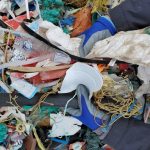New Podcast Mini-Series Makes Solutions to Plastic Pollution Their Resolution!

Written by Laura Stern and Jackie Bauman
Sometimes it feels like we are living in a plastic pandemic. An additional 24.9 million tonnes of plastic packaging are leaked into the environment each year – with a truckload of this plastic polluting our world’s ocean each minute! As a result, marine mammals can be entangled, and seabirds and other wildlife ingest plastic. Humans are also, often unknowingly, suffering the impacts of plastics. We inhale and ingest plastic every day in our food, water, and air. Industries such as fishing and aquaculture, are challenged with navigating marine debris hazards.
All types of ocean plastics are connected and contribute to one another. Single-use plastics such as takeout containers, ghost gear, or fishing line, are broken down by the ocean, eventually becoming microplastics. Microplastics are exceptionally concerning because they are the most bio available plastic pollutant, meaning that creatures of all sizes can ingest them. Species of all shapes and sizes, consuming microplastics feel full, but are lacking the nutrition they require. Fun fact: did you know that all mussel species scientists have thus far evaluated have been found to contain microfibers in their meat. The same meat that is available for human consumption. Consider what microplastics are doing in our environment; are you aware of the potential impacts on our health? While many questions remain about how this pollutant is jeopardizing our blue planet, we do know a little more about what is being done to #breakfreefromplastic.

Researchers from the Rural Resilience Group at Memorial University of Newfoundland, Jackie Bauman and Dr. Sondra Eger, who co-host the podcast series “Coastal Connections: Stories from the Atlantic,” recently released a three-part mini-series about plastics in the ocean. By interviewing experts from across Atlantic Canada, this series follows the story of your plastic water bottle, or disposable mask after you have finished with it, as well as what happens to the plastic woven fishing rope that is used to catch your favourite seafood! Episode 5- Refusing Plastic teaches us about the impacts of single-use plastic, and how the town of Lunenburg Nova Scotia came together to reduce their impact. Episode 6- Ghost Gear, ventures into New Brunswick to learn how fishers have taken the initiative to prevent lost or expired fishing gear from haunting their fishing grounds. Episode 7- Mind Your Microplastics ties it all together, discussing microplastics research conducted in Newfoundland and Labrador.

In each of the three episodes, listeners will learn about the unique organizations in coastal communities that are tackling the environmental and economic impacts of single-use plastics, marine debris, and microplastics. Each episode leaves listeners with take-home actions for anyone who wants to reduce their plastic footprint or are inspired to implement similar solutions the guests, within their own communities.
All the information we get through social media, news platforms, tv, and documentaries can feel overwhelming, and there is only so much we can do in our individual daily lives before policy needs to step in. If you’re really motivated to make an impact in your community, connect with other passionate individuals and raise your voices to your favourite restaurants, your local council, your premier, whoever oversees decision making when it comes to ensuring that plastic waste avoidance and reduction is a mandatory practice for everyone – from producer to consumer.
The most important thing the podcast team learned from the conversations with experts is that it’s not too late to act. You as an individual can have an impact on this insidious plastic problem and be a positive force for change! Whether you are a biologist, fisher, parent, or child, you can have a positive impact on your local waterway. Sometimes the greatest thing you can do is spark the conversation with others. Involve your friends and family and together you can encourage each other to make better consumer choices and influence business practices in your community.

2022 is an opportunity to reflect on the knowledge and lessons that we learned in 2021 and choose what we carry with us over the next year. Let us embrace the ways we can continue to educate ourselves on the complex issues and solutions of our time to ensure our world is cleaner and safer from future generations.
Click HERE to listen to Coastal Connections: Stories from the Atlantic, to learn more about the guests featured in this mini-series and for resources in each episode’s show notes!
If you are a listener of Coastal Connections – WE THANK YOU FOR YOUR SUPPORT – if you are a new listener, welcome, we hope you enjoy!
Feel free to drop us a line through Twitter – @ResilienceRural
Please enjoy Coastal Connections: Stories from the Atlantic on Soundcloud, Spotify, or Apple Podcasts:

